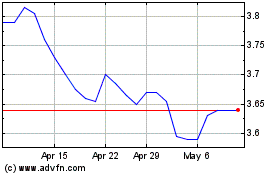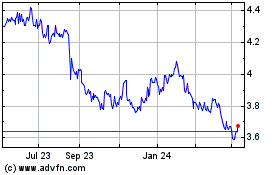Telstra Acquires Digicel Pacific in Partnership With Australian Government -- Update
October 24 2021 - 5:38PM
Dow Jones News
By Stuart Condie
SYDNEY--Telstra Corp. Ltd. agreed to acquire mobile networks in
six Pacific nations in a US$1.6 billion deal largely funded by the
Australian government, which foreign policy experts have said
wanted to block China from buying the assets.
Australia's largest mobile communications provider on Monday
said government-owned Export Finance Australia would provide
US$1.33 billion toward the deal. Telstra said it would contribute
the remaining US$270 million and own 100% of Digicel Pacific's
ordinary equity.
Australia's Department of Foreign Affairs and Trade said the
funding commitment was part of the government's so-called Pacific
Step Up initiative, which it said aims to develop secure and
reliable infrastructure in the region. The EFA will help to manage
financial and other risks associated with the acquisition, it
added.
"Telstra's acquisition sends an important signal about the
company's potential and about wider business confidence in the
future of the Pacific region," the department said.
Telstra Chief Executive Andrew Penn said Digicel Pacific, which
operates in Papua New Guinea, Fiji, Nauru, Samoa, Tonga and
Vanuatu, is a commercially attractive asset and critical to
telecommunications in the region.
"It is consistent with the Australian government's interest in
encouraging quality investment in the Pacific, the financial
arrangements make it very attractive for Telstra, and it
strengthens our relationships with the Australian Government and
the Pacific region," Mr. Penn said.
Analysts have suggested the acquisition could improve Telstra's
standing with the government ahead of the expected privatization of
Australia's National Broadband Network. Telstra and other providers
currently lease access to the network, the creation of which has
been an earnings headwind for providers over recent years.
The move is the latest by the Australian government seeking to
limit Chinese influence in the region, particularly in the
telecommunications sector. Australia has banned Chinese telecoms
firm Huawei Technologies Co. from involvement in its 5G mobile
network.
In 2018, Australia said it would build an undersea high-speed
internet cable to the Solomon Islands, shutting out Huawei from the
project. And more recently, Australia began reviewing on security
grounds a Chinese company's lease of the port in the northern
Australian city of Darwin.
If China acquired the Pacific mobile networks, it could monitor
Australian communications to and from the region and use its
control of the assets as leverage, John Lee, a senior fellow at the
United States Studies Centre at the University of Sydney, said in
July.
Mr. Penn said Digicel Pacific would sit within a new
international subsidiary when the deal completes within
three-to-six months. Telstra had already planned the creation of
the unit to hold assets including subsea cables, while its other
subsidiaries hold its fixed-line infrastructure, its mobile
infrastructure, and its customer-facing operations.
Mr. Penn said the transaction exceeded all Telstra's acquisition
criteria by being earnings-per-share accretive, being more
accretive than a share buyback, and boasting a
return-on-invested-capital higher than its
weighted-average-cost-of-capital. The purchase of privately owned
Digicel Pacific enhances Telstra's outlook, Mr. Penn added.
Write to Stuart Condie at stuart.condie@wsj.com
(END) Dow Jones Newswires
October 24, 2021 18:23 ET (22:23 GMT)
Copyright (c) 2021 Dow Jones & Company, Inc.
Telstra (ASX:TLS)
Historical Stock Chart
From Dec 2024 to Jan 2025

Telstra (ASX:TLS)
Historical Stock Chart
From Jan 2024 to Jan 2025
